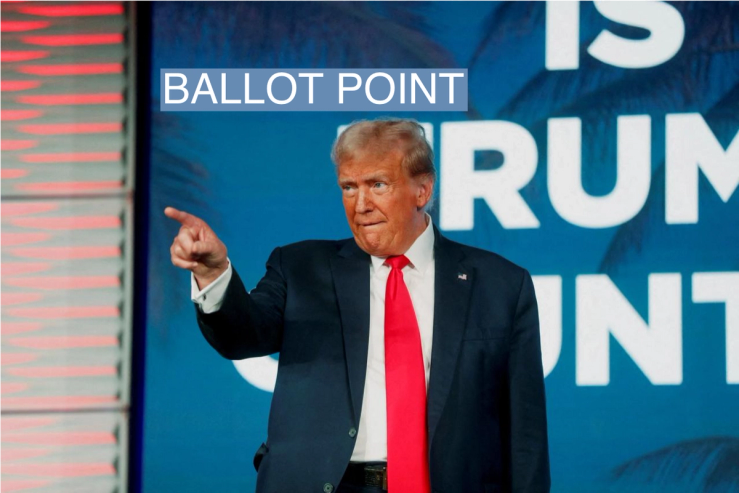The News
Former President Donald Trump will stay on Michigan’s primary ballot, the state’s Supreme Court decided Wednesday.
The court said that it declined to hear a case from groups working to keep Trump off the ballot.
According to a phone call obtained by The Detroit News, Trump allegedly pressed two election officials in Wayne County to not certify 2020 vote totals. Trump’s team has neither confirmed nor denied the legitimacy of the calls.
The ruling is a win for Trump as several states work to keep him off their primary ballots. Colorado’s Supreme Court last week ruled that Trump was responsible for inciting an insurrection and therefore ineligible to be on the state’s ballot, paving the way for a Supreme Court showdown.
SIGNALS
Michigan ruling won’t help Trump fight Colorado case
Under Michigan law, the Secretary of State “must place names on the primary ballot no matter their eligibility,” and the Michigan Supreme Court upheld that provision in ruling that Trump must stay on the ballot, constitutional law professor Anthony Michael Kreis said. Both the Colorado and Michigan cases presented challenges to Trump’s candidacy under the 14th amendment, but each of them “have different state law vehicles for placing names on the ballot,” he wrote. Those differences mean that this ruling will not help Trump in his Colorado case appeal to the U.S. Supreme Court, noted law professor Neal Katyal.
Trump doesn’t need to be convicted of insurrection to be pulled from ballots
Some conservatives have argued that Trump can only be left off the ballots if he is found criminally guilty of insurrection, but the insurrection provision of the 14th amendment “is a civil issue, not a criminal one,” argued law professor Ilya Somin. The ex-Confederates disqualified from holding office during the Reconstruction Era were never convicted of insurrection crimes, Somin explained, which suggests that the original meaning of the amendment doesn’t require “prior criminal conviction for insurrection—or any other offense—before an insurrectionist could be disqualified.” The legal system in the U.S. is specifically set up to make distinctions between criminal and civil liabilities (think O.J. Simpson), and the absence of a criminal conviction “doesn’t immunize [Trump] from civil proceedings arising from his role in the January 6 attack on the Capitol.”
Call to Michigan certifiers could be considered bribery
Trump and RNC Chairwoman Ronna McDaniel are in further legal jeopardy because the promises made to the Michigan election certifiers tick the boxes for bribery, former federal prosecutor Shan Wu wrote. Trump and McDaniel promised to find attorneys for the certifiers during their call, which isn’t illegal, but “there is something wrong when an offer to pay someone is to entice them to do something illegal,” Wu argued. That would make it more significant than the Georgia interference case, in which Trump asked the Secretary of State to “find 11,780 votes.”



